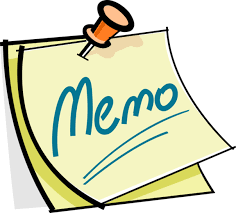A memo, or memorandum, is a written document that businesses use to communicate an announcement or notification. While memos were once the primary form of written internal communication in a business, they are now commonly sent in the form of an email.
Recommended
In this article, we explain what a memo is and demonstrate how to assemble the standard parts of a memo in a way that’s clear and concise. We also provide a sample you can use in the workplace.
What is a memo?
A memo is a short message that’s typically used to communicate official business policies and procedures within a company. Memos are usually meant as mass communication to all members of an organization rather than a one-on-one personal message. There are many types of memos, but they typically provide a progress report, asking someone or a team for something, confirm an agreement between parties) or request input on how to solve a problem.
Memo template
The following is a sample memo you can use as a guide for your next document:
Memorandum
To: [Names of intended recipients]
From: [Your first and last name, title]
Date: [Month, day, year]
Subject: [Subject of the memo]
[Begin with a sentence that describes the reason you are writing. It should be short, about one or two sentences. The intro should clearly state the purpose of the memo so the reader immediately understands what it’s about. If the memo is meant to respond to or follow up on a certain topic or situation, include that in the first paragraph].
-
[Bullet point #1 to list important information].
-
[Bullet point #2 to list important information].
-
[Bullet point #3 to list important information].
[Use the last few sentences to conclude your memo. Make sure you include a request for any action you need people to take after reading your memo].
Thank you,
[Your first and last name]
[Your email address]
[Your phone number]
If applicable, you can list an attachment of a document, image, graph or chart that your intended recipients might need.
To edit the template in Google Docs, go to File > Open > Upload > and select the correct file from your device.
When you should write a memo
For the most part, the purpose of writing a memo is to inform. However, memos can occasionally include a call to action or a persuasive element.
Here are some instances when a memo might be useful:
-
Informing employees about company policy or process changes
-
Providing an update on key projects or goals
-
Making an announcement about the company, such as an employee promotion or new hire
-
Reminding employees about a task that needs to be completed
-
Making a request of all employees
-
Communicating a message that employees will refer to more than once, such as a detailed proposal or recommendation
Memos are also an efficient way to communicate brief but important messages to a wide audience within the business. This can include product changes, meeting schedules, procedure changes, policy additions, summaries of agreement terms and reminders. Additionally, you can send a memo when you want your audience to print or save the information contained in the message in some way for later reference.
Related: Business Transformation guide with expert tips
How to write a memo
While each memo should be written to address its unique needs, there are a few steps you can follow to create a clear, highly readable document. Like many other professional business documents, memos will include an introduction, body and conclusion.
-
Start with a header that clearly indicates that the communication is a memorandum, the intended recipients, the sender, the date and the subject.
-
Write an introduction that uses a declarative sentence to announce the main topic of the memo.
-
Include a body paragraph with discussion points that elaborate or list the main ideas associated with the memo’s topic. To make your memo easier to read, write in short paragraphs and break the information into smaller, more manageable chunks. Since the recipients will likely be scanning the memo, you should also use subheadings and bulleted lists when possible.
-
Conclude your memo with any remaining information following the body paragraph. This is a summary of the memo and should clearly inform the reader of any actions required.
-
Close with your name, email address and phone number in case anyone needs to contact you.
-
Ensure any necessary attachments are included if your intended recipients will need to refer to other information, such as a graph, image or chart, below the end of your memo.
Tips for writing an effective memo
Here are tips to consider to improve your memo:
-
Always consider your audience when writing a memo. While an acronym or abbreviation might be commonly used in the marketing department, it could be unknown to the IT department. If you’re writing a memo for the entire company, use clear and concise language accessible to everyone. Keep it professional using business formal language.
-
Proofread and review before sending. Reading your memo aloud is a helpful way to check for typos, inconsistencies and tone. If you have time, share it with a trusted colleague who can offer a second pair of eyes. When sending a company-wide memo, you are speaking for the organization, so be sure the style and message are accurate.
-
Write a subject that is straightforward and clear. For example, if you need to send a memo announcing the observance of a holiday, include the name, date and day of the week of the observed holiday in your subject line. Send your memo at least a week before the event or due date so people have time to adjust their plans.
